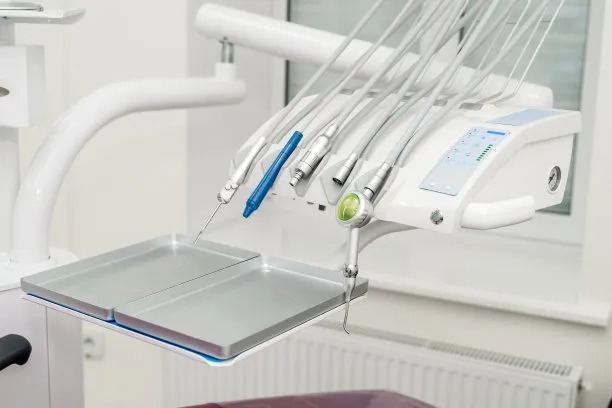Exploring the Latest Advances in Dental Implant Technology for Enhancing Oral Health and Restoring Smiles
Summary: The field of dental implants has witnessed remarkable advancements in technology, revolutionizing the way oral health is enhanced and smiles are restored. This article delves into four key areas of innovation: the materials used in dental implants, the techniques employed for implantation, the customization of implants for individual needs, and the integration of digital technology for improved outcomes. Each section offers insights into how these advancements contribute to both the longevity and effectiveness of dental implants, ultimately improving patient satisfaction and quality of life. This exploration reflects the ongoing commitment to elevate standards in dental care and the positive impact on an individual’s well-being.
1. Innovative Materials Revolutionizing Implants

The evolution of materials used in dental implants has been a game changer. Traditionally, titanium has been the go-to material due to its biocompatibility and strength. However, recent advancements have led to the development of zirconia implants, which offer aesthetic benefits, especially for patients with thin gums where metal visibility can be a concern. Zirconia is not only tooth-colored but also provides high resistance to wear and corrosion, making it an appealing alternative for many patients.
Moreover, the introduction of bioactive materials that encourage osseointegration has further enhanced implant success rates. These materials can actively stimulate bone growth and improve the integration process, allowing for faster recovery and greater stability of the implant. As researchers continue to explore and develop materials that support the bodys natural healing processes, the future of dental implants looks increasingly promising.
In addition to enhancing the aesthetic and biological properties of implants, advancements in nanotechnology have led to the creation of coatings that improve biocompatibility. These surface modifications can significantly enhance how well the implants bond with the bone, thus reducing the risk of failure and complications.
2. Advanced Techniques for Implantation
Traditionally, dental implant procedures required extensive surgical intervention, which often resulted in longer healing times and greater discomfort for patients. Recent advancements have introduced techniques such as flapless surgery, where implants can be placed without incisions, significantly reducing recovery time and post-operative discomfort.
Furthermore, guided implant surgery has gained traction due to the precision it offers. Utilizing 3D imaging and computer-aided technology, dentists can create a precise roadmap for implant placement, minimizing the risk of errors and damage to surrounding tissues. This method enhances the accuracy of the procedure, resulting in better outcomes and often a faster healing process for patients.
Another technique making waves in the field is immediate loading of implants, which allows patients to leave the dental office with temporary teeth the same day as the surgery. This approach not only provides immediate aesthetic benefits but also promotes patient morale and satisfaction as they experience minimal disruption to their daily lives during the recovery phase.
3. Customization for Individual Patient Needs
Every patient is unique, and the latest advances in dental implant technology emphasize personalization. Custom implant designs can be created using advanced imaging technologies such as Cone Beam Computed Tomography (CBCT). This scanning technology allows for precise assessments of an individual’s anatomical structures, facilitating tailored implant solutions based on specific bone quality and quantity.
Additionally, 3D printing technology has emerged as a powerful tool in creating customized implants and surgical guides. This technology allows dental professionals to fabricate patient-specific components, ensuring that every implant fits perfectly and aligns optimally with other teeth. Such personalization enhances not only function but also comfort for patients.
With the growing trend towards individualized care, many clinics are now offering biomimetic implants designed to replicate the natural tooth structure closely. These highly tailored solutions ensure better compatibility and aesthetic outcomes while reducing discomfort during the healing process.
4. Digital Integration Enhancing Patient Care
Digital technology has significantly enhanced many aspects of dental care, particularly in implantology. The use of digital scans and 3D models allows for enhanced visualization and planning of the implant procedure, providing both dentists and patients with a clear understanding of what to expect before surgery begins.
Moreover, the integration of software solutions for simulation and planning has revolutionized patient consultations. Patients can now visualize the expected outcomes of their implants, fostering confidence and satisfaction in the treatment process, which ultimately leads to better cooperation during post-operative care.
The rise of tele-dentistry, particularly in the wake of global challenges, has enabled professionals to monitor recovery and provide guidance through remote consultations, making the implant journey more accessible and streamlined for patients. This accessibility not only supports recovery but ensures that any concerns can be addressed promptly, leading to improved overall care.
Summary:
In conclusion, the advancements in dental implant technology represent a significant leap forward in how oral health is managed and smiles are restored. From innovative materials and reduced recovery times to personalized treatments and digital integration, these improvements collectively enhance the patient experience and outcomes in dental implantation.
The future of dental implant technology is remarkably bright, promising further innovations that will continue to transform the landscape of oral health. As dental professionals embrace these advancements, the hope is that more individuals will experience the life-changing benefits that come with improved implant technology.
This article is compiled by Vickong Dental and the content is for reference only



